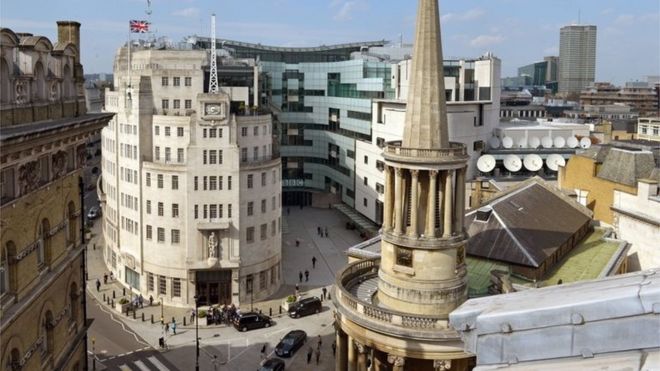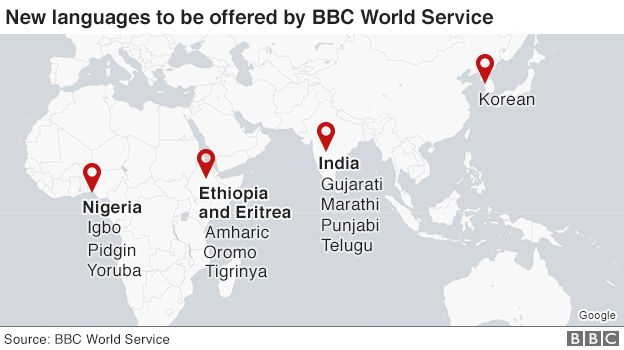
The BBC World Service will launch 11 new language services as part of its biggest expansion "since the 1940s", the corporation has announced.
The expansion is a result of the funding boost announced by the UK government last year.
The new languages will be Afaan Oromo, Amharic, Gujarati, Igbo, Korean, Marathi, Pidgin, Punjabi, Telugu, Tigrinya, and Yoruba.
The first new services are expected to launch in 2017.

African languages:
- Afaan Oromo: Language of Ethiopia's biggest ethnic group
- Amharic: Ethiopia's official language
- Tigrinya: The main working language of Eritrea, along with Arabic. Also spoken in Ethiopia
- Igbo: An official Nigerian language. Also spoken in Equatorial Guinea
- Yoruba: Spoken in south-western Nigeria and some other parts of West Africa, especially Benin and Togo
- Pidgin: A creole version of English widely spoken in southern Nigeria, Ghana, Cameroon and Equatorial Guinea
Pidgin - West African lingua franca
Asian languages:
- Gujarati: Native to the Indian state of Gujarat but found around the Indian subcontinent and the world
- Marathi: From the Indian state of Maharashtra, including India's commercial capital Mumbai
- Telugu: Huge numbers of speakers, like many Indian languages, primarily in Andhra Pradesh and Telangana
- Punjabi: One of the world's most populous languages, it is widely-spoken in Pakistan and parts of India
- Korean: Spoken in North and South though the dialects have diverged. Pop culture slang and foreign loan words are notably more common in the South

"This is a historic day for the BBC, as we announce the biggest expansion of the World Service since the 1940s," said BBC director general Tony Hall.
"The BBC World Service is a jewel in the crown - for the BBC and for Britain.
"As we move towards our centenary, my vision is of a confident, outward-looking BBC which brings the best of our independent, impartial journalism and world-class entertainment to half a billion people around the world.
"Today is a key step towards that aim."
'Relevant as ever'
The plans include the expansion of digital services to offer more mobile and video content and a greater social media presence.
On Wednesday the BBC launches a full digital service in Thai, following the success of a Facebook-only "pop-up" service launched in 2014.
Other expansion plans include:
- extended news bulletins in Russian, with regionalised versions for surrounding countries
- enhanced television services across Africa, including more then 30 new TV programmes for partner broadcasters across sub-Saharan Africa
- new regional programming from BBC Arabic
- short-wave and medium-wave radio programmes aimed at audiences in the Korean peninsula, plus online and social media content
- investment in World Service English, with new programmes, more original journalism, and a broader agenda
BBC World Service expansion
£289m
investment
11
new languages
12 new or expanded daily TV and digital bulletins
40 languages covered after expansion
500m people reached by 2022 - double the current number
1,300 new jobs, mostly non-UK
Fran Unsworth, the BBC's World Service director, said: "Through war, revolution and global change, people around the world have relied on the World Service for independent, trusted, impartial news.
"As an independent broadcaster, we remain as relevant as ever in the 21st Century, when in many places there is not more free expression, but less.
"Today's announcement is about transforming the World Service by investing for the future.
"We must follow our audience, who consume the news in changing ways; an increasing number of people are watching the World Service on TV, and many services are now digital-only.
"We will be able to speed up our digital transformation, especially for younger audiences, and we will continue to invest in video news bulletins.
"What will not change is our commitment to independent, impartial journalism."
The new language services mean the BBC World Service will be available in 40 languages, including English.
Lord Hall has set a target for the BBC to reach 500 million people worldwide by its centenary in 2022.
What is Pidgin?
The Oxford English Dictionary definition of Pidgin is: A language containing lexical and other features from two or more languages, characteristically with simplified grammar and a smaller vocabulary than the languages from which it is derived, used for communication between people not having a common language; a lingua franca.
Simply put, Pidgin English is a mixture of English and local languages which enables people who do not share a common language to communicate.
Most African countries are made up of numerous different ethnic groups who do not necessarily have a lingua franca, so Pidgin has developed.
It is widely spoken in Nigeria, Ghana, Equatorial Guinea and Cameroon.
There are differences, because English is mixed with different languages in each country but they are usually mutually intelligible.
A form of Pidgin has developed into a mother tongue for the Krio community in Sierra Leone, which non-Krios can find difficult to understand.

What is so special about Pidgin?
"It's quite fluid, it keeps changing all the time and it's expressive as well," says Bilkisu Labran, head of the new BBC language services for Nigeria.
"Sometimes, if you don't have a word for something, you can just create an onomatopoeic sound and just express yourself. And it will be appreciated and understood.
"I can talk about the gun shots that went 'gbagbagba' and you get my gist. So it vividly captures it instead of describing or trying to find a word to say: 'The gun shots were very loud'."
Also, Pidgin hardly follows standard grammatical rules so "you can lose things like verbs", by saying: 'I dey go' to mean 'I'm going'.
Other examples are:
- I wan chop ( I want to eat)
- Wetin dey 'appen? (What is happening?)
- I no no (I do not know)
- Where you dey? (Where are you)

How many people speak it?
It is difficult to know the precise number of speakers across the region as it is not formally studied in schools and is spoken in varying degrees of proficiency.
But many millions of people undoubtedly speak it on a daily basis, especially young people.
Nigeria is estimated to have between three and five million people who primarily use Pidgin in their day-to-day interactions. But it is said to be a second language to a much higher number of up to 75 million people in Nigeria alone - about half the population.
Although it is commonly spoken, Pidgin is not an official language anywhere except Sierra Leone, where Krio does have a formal status.
In many schools, children are disciplined if they are caught speaking Pidgin, rather than English.
However, some local radio stations do broadcast in Pidgin.

How did it originate?
West African Pidgin English, also called Guinea Coast Creole English, was a language of commerce spoken along the coast during the Atlantic slave trade in the late 17th and 18th Centuries.
This allowed British slave merchants and local African traders to conduct business.
It later spread to other parts of the West African colonies, becoming a useful trade language among local ethnic groups who spoke different languages.
"The art of living consists of knowing what to pay attention to and what to ignore." -- Mardy Grothe